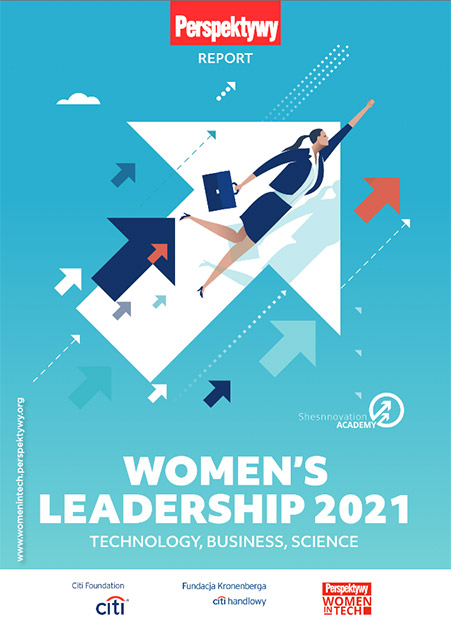Womens’ Leadership 2021. Technology, Business, Science
Only 6% CEOs of the world’s biggest companies are women. In Poland women make up about 15% of board members in listed companies (the EU average is 25%), and they have a share of about 30% on the senior management level (in the tech industry it is a little less – about 20%). The also make up 1/3 of innovative startup owners. Among university rectors they are about 8% (until the last term there were none at all at this level). Research shows that organisations with higher participation of women achieve better results from the financial and managerial point of view .
What are the determinants of women’s leadership in technology and science, and how can they be fostered? – this is the question that the creators of the “Women’s Leadership 2021. Technology, Business, Science,” i.e., the Perspektywy Education Foundation and the Citi Foundation asked themselves.
It was launched online on 25 June at 12:00.
“In 2021 we feel it as strongly as never before: the world is standing at crossroads. We need a vision for the future and completely new narrative. We need a new type of leadership – wide-perspective oriented, sustainable existence in the world, compassion and responsibility. More and more often, women are such leaders,” said at the launch dr Bianka Siwińska, the managing director of the Perspektywy Education Foundation and science director of the report. “This is clearly visible in the fight with the results of the pandemic, it can be seen during social and political protests. For the first time in history women are really utilising their full potential, changing the world and standing up for themselves. In Poland, in Belarus, in Argentina, everywhere you can hear their voice.” And we at Perspektywy Women in Tech make sure that it can also be heard in technology, innovation, and science.
Dorota Szostek-Rustecka, chair of the Kronenberg Foundation, noted: “This report is another stage of our deep dive into the subject of women’s presence in business, especially technology. In this report we speak about how important is women’s presence in leadership positions – this presence makes concrete capital today, which translates into companies’ financial results. If we look at it globally, the numbers are convincing: it is said that during the next 20 years the GDP will increase by 6 per cent, if women’s presence in the job market also increases. It is therefore in our economic interest to work on getting more women into leadership and the labour market. This report may help, because on one hand is gives directions to the women who want to be leaders, while on the other it is excellent material for organisations wishing to work on inspiring more women to develop towards leadership.
The report was created as a result of a study(a survey) conducted among 750 leaders (entrepreneurs, startuppers, managers in high positions in companies, scientists with managerial responsibilities at universities and research institutes,a s well as young persons demonstrating leadership skills during their studies). the goal was to analyse the phenomenon of women’s leadership in the millennial generations, which are the most active in the labour market.
Who are the 2021 Leaders?
Sisterhood and the power of role models
The research shows that the common features of women leaders from the millennial generation include: self-confidence (this is the main attribute of leaders which is key to successful career building), decision-making, ability to compete and willingness to take risks, charisma, and passion. The leaders themselves most often pointed to such features as empathy and authenticity (honesty), while they believe that they should develop more, e.g. their assertiveness.
A very important quality of today’s women leaders is that they actively work to support other women (they strive to improve their situation), understanding how important to women is mutual inspiration (role models) and fighting gender stereotypes. How do they do it? They engage as mentors, they choose legal lobbying in order to improve the situation of women in the labour market, they participate in events promoting women’s leadership.
What needs to be emphasised is the fact that millennial generation leaders point to themselves: they themselves have or had in their immediate environment a female leader and this example strongly influenced the development of their own leadership qualities – this person was their model. Often they also received more support in their work environment than non-leaders. Often they also worked (as part of mentoring) on developing their leadership skills (indicated twice more often than among non-leaders).
And another important common quality of the leaders, proving the importance of sisterhood in their biographies: as mothers, the leaders had help from their families (mothers, mothers-in-law) in their household chores, which leads to a conclusion that such support may be one of the conditions of a successful leadership career in today’s conditions.
Exposed to violence
On the other hand, the disturbing conclusions from the “Women’s Leadership 2021. Technology, Business, Science” report is the one that leaders are exposed to cyberbullying more often than other groups of women (especially the youngest group of leaders is exposed to this type of violence three times more often than other women), mobbing, and sexual harassment (they experience the latter almost twice as often as non-leaders!). Leaders mention problems with unfair treatment more often than other women (e.g. having to deal with higher expectations at work than their male colleagues).
Another form of discrimination that leaders need to deal with is non-serious treatment – this is mentioned the most by fresh graduates (age 26 to 31). Another problem turning up repeatedly in the survey is the problem of sexist comments/jokes heard by the leaders during their professional careers. Only 7% leaders never experienced violence, discrimination, and aggression in their professional lives.
Free in labour market
Despite the above difficulties the leaders are proud of the fact that their careers are dynamic, they are promoted more often, but also – very symptomatic for this group – they themselves are not afraid of making changes, even radical ones (more than a half of them completely changed industries at least once) to their professional path.
When asked for their goals for the future, the millennial generation women leaders mention they want to focus mostly on introducing innovations in their field. They also intend to keep their upward movement in the company structure. One in three would like to improve the fate of women.
The report shows that the leaders are very aware of their competences – they evaluate their communication, negotiation and mediation skills much higher than other women, and they also claim that they are good at project management. What they would like to develop in terms of leadership skills, on the other hand, is their legal and financial knowledge (they often say that as their responsibilities increased, they began to feel gaps in these areas of management).
Mentoring is more important than studying
An important conclusion from the report is the one about self-education as the source of leader’s competences and knowledge. The leaders pointed to experiences related to the activity in a student or doctoral organisation as their school of leadership (e.g. in the field of team management) more often than to a school or university.
Other experiences that helped the leaders to hone their skills included work with a coach/mentor or self-education (e.g. from books and specialist articles – this was the source of leadership knowledge for 73% of the leaders surveyed).
Sensitivity to the fate of the Earth
Conclusions from the “Women’s Leadership 2021. Technology, Business, Science” report are unambiguous: the millennial generation leaders are women sensitive to the climate crisis (85% changed their everyday habits in relation to the climate catastrophe). Almost three quarters of the leaders, when asked about the biggest challenges the humanity will face in the nearest future, pointed to pollution and climate change. Other frequent answers included, e.g.: lack of food and water, unemployment, poverty and economic problems, followed by lack of education, COVID pandemic or other possible pandemics, a global conflict or religious conflict.
The “Women’s Leadership 2021. Technology, Business, Science” report was created as part of the “Shesnnovation Academy” program, with the support from the Kronenberg Foundation. The report ebook (in Polish and English) can be downloaded from www.womenintech.perspektywy.org.










